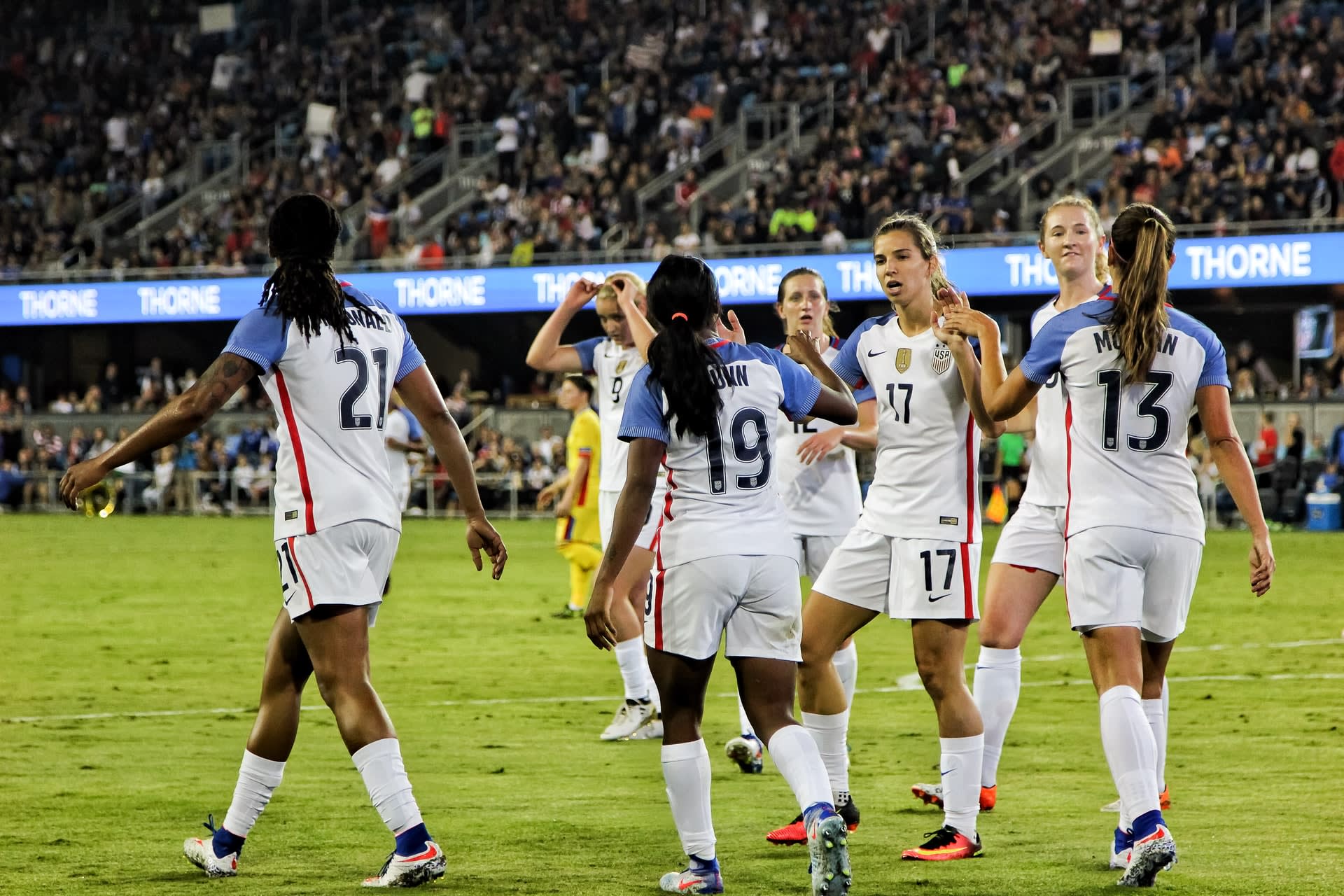How Students Can Grow Women's Football
Women’s sports have been growing at a pace we’ve never seen before. One of the fastest-growing sports is women’s football, which has gained more global attention with each passing year. This growth isn’t just due to the quality of current female athletes -- it’s also due to the number of women behind the scenes fighting to put women’s sports under its well-deserved spotlight. Let’s explore how you as a student can be a part of this change…
- Education

Women’s growing success
Women have been gaining more space in the world of sports, and one look at the recent Tokyo 2020 Olympics provides quick proof of that: according to the International Olympic Committee (IOC), 48.8% of the athletes that competed in Tokyo were women, which means that over 5.000 women competed in over 300 events. It’s expected that in Paris 2024, for the first time in the history of the Olympic Games, women will make up exactly half of all athletes.
And women haven’t been growing only in participation numbers - they are also achieving more success every year. Team USA led the ranking in this year’s Olympic Games, winning 113 medals, of which female athletes won nearly 60%.
This accelerated change is closely linked to the gender equality movement. Women are fighting like never before to assure their place in the world, and that includes the fight for equal rights for female athletes in every country. One of the best-known examples of this is the USA Women’s National Team fight against U.S. Soccer for equal pay, led by stars Alex Morgan and Megan Rapinoe.
Successful women in the game
Women in football are shining, and not only on the pitch. From coaches to club managers or broadcast commentators, there is no shortage of essential roles for women in the world of football. And there are just as many success stories to inspire those who wish to pursue a career in sports.
This year, Alex Scott became the first English-speaking female commentator in the FIFA 22 videogame. She said: “This is a big moment for FIFA, for football and women and girls across the world.” Scott followed the Spanish presenter Nina Juanco, who appeared in FIFA 21 as the first female commentator in the history of the series.
Another inspirational story is that of Brazilian referee Edina Alves Batista: she went from working as a soil-collector to a referee course to officiating the semi-final match between England and the USA at the 2019 Women’s World Cup. Also Batista is now a role model for women breaking down barriers in football, and she is only one of the many female football referees who made history.
But, while hard work is the main force that drives women to success, some can count on a bit of fairy-tale magic to help make their dreams come true. That is how Arianna Criscione describes her path to a dual role in the world-renowned club Paris Saint-Germain (PSG). After a successful career as a goalkeeper in Sweden, Italy, and the Netherlands, Criscione was ready to retire. Yet, her plans changed drastically after a chance encounter with PSG’s women’s team sporting director Bruno Cheyrou on an airplane.
Criscione had just finished her Master’s Degree at The Football Business Academy and was ready to transition from being on the pitch to working the business side. Then, after a conversation about the future of women’s football, the possibility of pursuing her off-field career while also playing as a goalkeeper arose and Criscione knew she had just found the opportunity of a lifetime!
Fellow FBA graduate Paula Quintero has also developed the woman’s game both on the field and off it. She was born in Colombia and moved to the USA when 10. She fell in love with the beautiful game and played for the U20 Colombian National team in 2014 in the World Cup Qualifiers and got a scholarship to play for Florida International University (NCAA Division 1). After graduating in 2018 with a Bachelor’s Degree in Sports Management and minor in Marketing, she signed a professional contract for Independiente Santa Fe in Colombia.
She then interned for CONCACAF in the Women’s Football Department and loved the experience. Her time there, and the onset of the pandemic, led her to The FBA.Wanting to learn more about sports business, specifically football business, she found The FBA.
“I started with The FBA in March 2020,” she explains. “The first months are virtual so given the circumstances of being quarantined most of us (me and my classmates) had more time to be focused on the lessons. After the two virtual modules the next step is to do an Internship. I started with Atalanta Media (Ata Football) which was another priceless opportunity. Its mission and vision of elevating the women’s game connected so much with me, it was the perfect fit!”
The value of women’s sports
Despite this growing interest, there is still a significant disparity in women’s football. Many clubs still don’t offer female players access to the same basic services and training facilities as male players. Additionally, women’s games and tournaments haven’t always been broadcast on television, but the recently increased investment into putting women’s sports on mainstream TV shows the potential for an untapped audience that can offer valuable opportunities.
Sports marketer Rodrigo Pons created a framework that shows the three primary stakeholders that make a sport more relevant: sponsors, media, and participation/fans. Analyzing the consumer practices of American football in Rio de Janeiro, Pons registered how the increase of one of these stakeholders sparks the growth of the others.
According to Pons, investment by a sponsor makes the sport more appealing to the mainstream media. Presence in the mainstream media makes more people connect and engage with the sport, making the sport even more attractive to sponsors. This cycle can be started by any of the three stakeholders, move in any direction, and keep working in an upward cycle.
“Women's football has grown and developed rapidly in recent years,” Francesco Bonomo, an FBA graduate from Italy, explains. “If we analyze some data and compare the participation and the spread of women's football in the last ten years we can see the growth has been continuous and for some factors, the numbers have doubled. Not surprisingly, one of FIFA's most ambitious goals is to double participation to 60 million by 2026.”
“The consequences of this significant growth have also led to important questions being raised about the governance of the game and whether women are adequately represented in leadership positions across the sport. In any case, I believe that overall we are on the right track. A key aspect behind women's football is the concept of professionalism and we are all seeing almost all the major leagues have taken this direction.”
But it’s not just the fiscal or organisational impact -- women’s football, and women’s sport in general, has the power to change lives and change society. Quintero says, “I think sport and more specifically football has the power to change the world. There’s a quote by Nelson Mandela that clarifies the impact it has on society. It’s a quote that always stays close to my heart and motivates me to continue to pursue my career in the football industry. “Sport has the power to change the world. It has the power to inspire, it has the power to unite people in a way little else does.”
I truly believe in this because I’ve experienced it many times. Football is the most popular sport in the world, it can change lives and make a positive impact in society globally that is one reason why it’s also known as the beautiful game.”
Why study football business?
Football is the most popular sport in the world. With an estimated total of four billion fans around the world, the football business is one of the largest industries today. Working in football business means participating in the development of a sport that changes people’s lives every day.
Having a solid understanding of the football market and good connections plays a fundamental part in breaking into the industry. This is precisely what the Professional Master in Football Business at The Football Business Academy offers its students.
Focusing on the three pillars of knowledge, network, and experience, The FBA program guides students throughout the four-module program. Over the course of one year, students will attend online classes and guest lectures, participate in business events, and have a guaranteed internship period at football clubs or related associations.
The FBA has partnerships with world-class institutions like Soccerex, Olympique Lyonnais, SL Benfica., and many others that will give its students an unmatched professional experience in the football market, preparing them for a successful career at the heart of the world’s most beloved sport.
Lukas Schmidsberger joined The FBA after having worked in international business and finance and felt something was missing, so he decided to pursue a career in a field he is passionate about.
As he started at The Football Business Academy, he also started working part-time at his hometown football club LASK, in Linz, Austria. Due to COVID he couldn't do his FBA internship abroad and decided to stay at LASK, which “turned out to be a blessing in disguise”. At first, he was offered the role as UEFA Main Contact, taking care of everything around LASK’s participation in international club competitions, then he was asked to help build a women's football team from scratch. He is now preparing for LASK’s matches in the UEFA Europa Conference League while managing all administrative issues with the women's team.
“The most important features of the FBA are the mandatory internships and the people you get to know along the way,” he explains. “The family spirit at The FBA still allowed me to make great friends. In my opinion, this family spirit is what really sets The FBA apart from other institutions. The education itself is very broad and allows you to explore multiple areas around the world of football. This gives you a good overview of what is out there and helps you to find the area you want to go into.”
“The Academy first and foremost tries to establish networks on top of providing a good education. I, for example, have already run into situations where I could call members of The FBA network to solve job related problems. This is, in my opinion, what The FBA strives to do.”
If you want to be part of this great family, check out The Football Business Academy today.
Article written in association with The Football Business Academy.
Find your perfect program
Use our search to find and compare programs from universities all over the world!
FBA The Football Business Academy
Thaís Roberto
Author
Thaís graduated with a degree in Language and Literature and is now pursuing her master's while working as an English teacher and freelance writer. She lives in an inland city in São Paulo, Brazil, and enjoys binge-watching TV, game nights with her friends, and learning how to play any musical instrument within reach
Find a program in these categories


